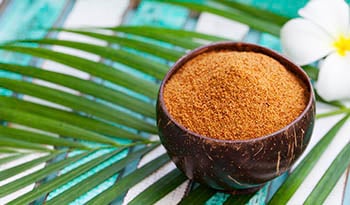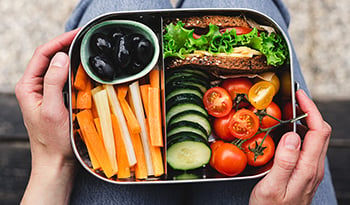How to Spot Added Sugars + 4 Healthy Alternatives
DISCLAIMER:This blog does not intend to provide diagnosis...
- In this article:
- Do We Really Need Sugar?
- Why Is Sugar So Powerful?
- Sugar and Your Mental Health
- How to Spot Added Sugars
- 4 Alternatives to Sugar
- There Is No Magic Substitute

Table sugar, or sucrose, derived from the sugar cane plant, is the third most-produced commodity in the world second to cereals and rice. Some historians believe that indigenous people in Papua New Guinea chewed sugar cane roots for their sweet flavor millennia ago. Throughout the ages, its cultivation spread to other cultures, including the Greeks and Romans who used it as medicinal elixirs.
Sugar’s commercialization and uses to sweeten food were due to its large-scale cultivation for refinement by the Spanish and Portuguese, who brought the crop to the new world for mass production. Sugar fueled the economies of many countries due to the millions of people across the Atlantic who craved the substance. The large-scale cultivation of sugar also increased the need for free labor, therefore fueling the slave trade. Many wars were waged in the Caribbean between European nations from the 16th to 19th centuries to control the production of sugar and its resulting income.
Sugar was initially thought to have health benefits, a claim supported by a famous 1960s animated musical that suggested that a spoonful aids the ingestion of bitter medicines. In recent decades, its mass consumption has been implicated in the rise of obesity and increasing numbers of chronic conditions.
Do We Really Need Sugar?
Many carbohydrates in the human diet, like rice, wheat, corn, and potatoes contain vitamins and minerals. Sucrose is a type of carbohydrate that can be found in plants, fruits, and vegetables. Table sugar has been refined from the natural sugar found in these plants, fruits, and vegetables, such as sugar beets and sugar cane.
Added sugars are caloric sweeteners that are added to processed foods. These are different from artificial sweeteners, which contain minimal calories. The American Heart Association (AHA) and the National Health System (NHS) recommend a daily intake of sugar to be no more than 5% of the caloric intake of a 2,000 calorie diet, which is roughly 25 grams of added sugar per day. Many people around the world consume at least 100 grams of sugar per day. This added sugar is not an essential nutrient as it provides only empty calories.
Table sugar not only adds a sweet flavor we are accustomed to and often crave, but it is also used by food manufacturers that add it to enhance flavor, provide texture, increase shelf-life, and improve freezing, color, and moisture retention.
Nearly half of all added sugar used in food processing can be found in sugar-sweetened beverages, including colas, fruit drinks, sports and energy drinks, coffees, and even alcoholic beverages. They can also be found in prefabricated meals, dairy products, such as fruit yogurts, condiments like ketchup and relish, spreads, and even salad dressings.
Why Is Sugar So Powerful?
Added sugar and its ubiquity is a very recent development to the human diet. From an evolutionary perspective, as a species, we developed a taste for sweet sugary foods because these indicate a high caloric content. This also served to indicate that sweet foods are safe, protecting us from the bitter, unpleasant taste of poisonous or rotting foods that can make us sick.
Even though our diet evolved, and we no longer risk our lives for our daily meal, our brains have retained the same wiring. Our reward system is activated when we consume sugar. Dopamine, the “feel-good” signaling molecule in the brain involved in the reward system, is released when we bite into a sugary snack, increasing our continued craving for sugar.
Therefore, with sugar, there is a strong reward pathway and a strong dopamine response. We end in a cycle of wanting more, craving more, and feeling like we need more. This is the desired response that many food manufacturers rely on to keep us hooked on sugar.
Sugar and Your Mental Health
The consumption of excess sugar may negatively affect your mental health. In a prospective study, researchers in the United Kingdom found an association between high table sugar consumption from sweet food and beverages and increased risk of depression after conducting several surveys with food and mental health questionnaires.
A study by Knüppel et al observed that sugar can influence various neurotransmitters in the brain and the receptors to those neurotransmitters, particularly dopamine, contributed to the development of habitual sugar intake.
It’s important to remember that although this study found an association between high sugar consumption and higher rates of depression, depression can also lead to an increase in cravings and consumption of sugary foods.
Another study performed by researchers at the University of California at Davis compared sucrose sweeteners versus artificial sweeteners made from Aspartame. The study provided evidence that sucrose sweetened beverages inhibited cortisol, the stress hormone. Sucrose also activated the hippocampus, the part of the brain that is responsible for memory, learning, and emotional responses and behavior.
Normally, during a moment of stress, cortisol is released, which signals the body to use energy from food to engage in the “fight or flight” response. The hippocampus then prompts the body to regulate the release of this hormone. In this study, sugar was shown to inhibit this regulation while slowing the release of stress-induced cortisol secretion, thus creating a sense of safety and comfort. This may contribute to a craving for sugar and its effect on decreasing stress in the body and the brain, which also contributes to cravings for “comfort foods” at times of stress.
Therefore, this increase in cravings, desire, and perceived need for sugar may lead to an increased risk of obesity and other chronic conditions, especially for individuals who live in conditions or in communities where stress is more prevalent.
How to Spot Added Sugars
Historically, the human species faced the dangers of predators and poisonous food, which caused immediate sickness or death. Although this threat no longer exists, new dangers may put us at an increased risk of chronic conditions in the future. Thus, it is important to know how to identify foods that may have added sugars when you make your next grocery run.
Some detective work will be required, but due to regulations made by many food regulatory agencies, added sugars can now be found on the nutritional labels for food and beverages. You can also scan the ingredient list.
Added sugars can have a variety of sources and names, including:
- Cane Sugar
- Corn Syrup Or Sweetener
- Sucrose
- Molasses
- Brown Sugar
- Fruit Juice Concentrates
4 Alternatives to Sugar
Many sugar substitutes to table sugar are available, including zero-calorie sweeteners that can be a supplement to make your foods sweet and delicious.
Stevia
Some zero-calorie sweeteners are synthetic like sucralose, but others like stevia are plant-derived and are all-natural.
Stevia is attractive to many people as it has minimal caloric value compared to the amount of table sugar needed to achieve the same desired sweetness. Therefore, it can be a good alternative if weight loss is your goal.
Xylitol
Sugar alcohols like xylitol are another alternative. The name can be confusing to some as it can be misinterpreted as containing alcohol, but these alcohols do not contain ethanol, which is what is found in alcoholic beverages. Sugar alcohols are found in certain fruits and processed foods like chocolates, chewing gum, and toothpaste.
Coconut Sugar
Lastly, natural sugar, such as sugar derived from the coconut, is another sugar substitute that is promoted as a healthier option to sugar substitutes. Coconut sugar is reported to have higher nutrients than sugar cane.
Although a study found higher contents of vitamin C and B complex in coconut sap, the granulation process of the sap may destroy these vitamins and minerals.
Honey
Honey and honey powder have also been touted as other sugar substitutes given the presence of antioxidants, but their nutrient content is minimal, and honey is still another form of sugar.
There Is No Magic Substitute
When doing your grocery shopping or reading food labels, there remains no substitute for the nutritional benefits or natural remedies of unprocessed fruits and vegetables. As a society, we have been hooked on the practicality of having juices, meals, and desserts manufactured for us at our convenience. The price of convenience is not billed immediately, but rather insidiously in the form of many chronic conditions.
During your next trip to the market, avoid the middle aisle as much as you can, as these are the places where the majority of manufactured foods are located. Food manufacturers are ultimately businesses that are trying to make a profit. The term “all-natural sugar” does not mean that it’s healthier, it just means that it’s found in nature. If you are choosing a sugar substitute, choose one that fits your goals and taste preferences while keeping the latter in mind.
Remember, your health is not only physical, but it is also mental and emotional. If you or anyone you know is experiencing symptoms of depression, anxiety, or any concerning, unexplained symptoms, speak with your doctor or a mental health provider or call emergency services if the situation is serious. If you strive to maintain a healthy diet filled with unprocessed fruits and vegetables while being cognizant of added sugars, you’ll be on the right path to a healthy mind and body.
References:
- Added Sugar in the Diet. The Nutrition Source. Harvard T.H. Chan School of Public Health. Website. Accessed 06/29/2020.
- Asghar, M., Yusof, Y., Mokhtar, M., et al; Coconut (Cocos nucifera L.) sap as a potential source of sugar: Antioxidant and nutritional properties. Food science & nutrition. 2019. 8(4): p. 1777-1787.
- Food and Agriculture Organization of the United Nations. Sugar cane crop data. Website accessed 06/29/2020.
- Knüppel, A., Shipley, M., Llewellyn, C., & Brunner, E.; Sugar intake from sweet food and beverages, common mental disorder and depression: prospective findings from the Whitehall II study. Scientific reports. 2017. 7(1).
- Mayo Clinic Staff. Artificial Sweeteners and Other Sugar Substitutes. Nutrition and Healthy Eating. Mayo Clinic. Website. Accessed 06/29/2020.
- The Sugar Association Website. Accessed 06/29/2020.
- Tryon, M., Stanhope, K., Epel, E., et al.; Excessive Sugar Consumption May Be a Difficult Habit to Break: A View From the Brain and Body. The J of Clin Endo and Met. 2015. 100(6): p. 2239-2247.

 By Dr. Gabriel Espinoza, M.D.
By Dr. Gabriel Espinoza, M.D.


